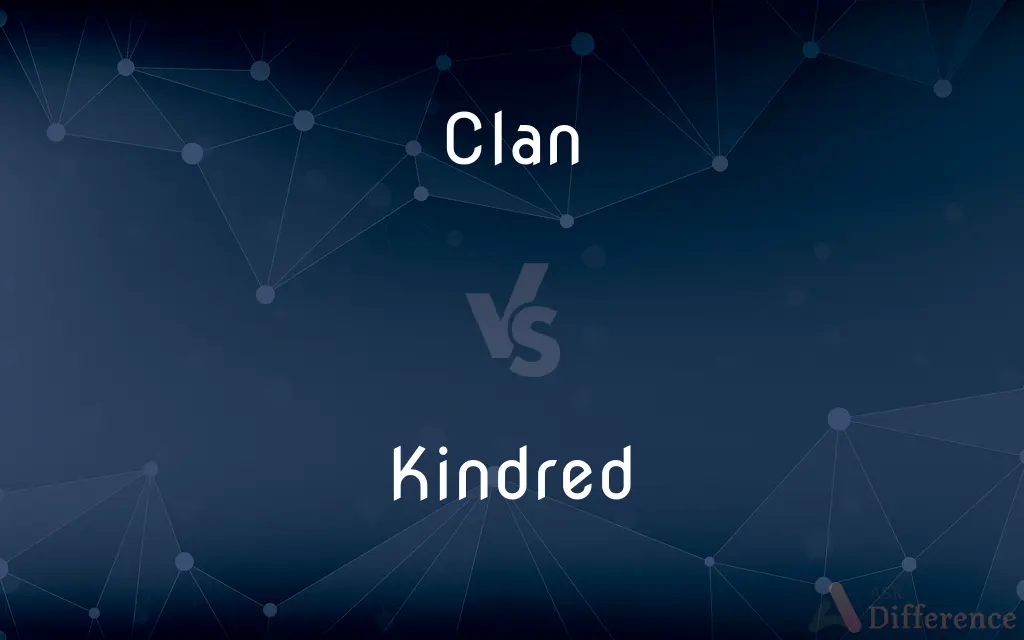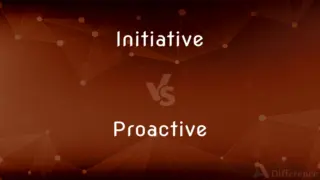Clan vs. Kindred — What's the Difference?
By Urooj Arif & Maham Liaqat — Updated on March 26, 2024
Clan typically refers to a group of families or people with a common ancestor, while kindred denotes a broader sense of connection, often blood-related but extending to affinity.

Difference Between Clan and Kindred
Table of Contents
ADVERTISEMENT
Key Differences
Clans are historically and culturally defined groups, often associated with specific geographic regions or tribal affiliations, where membership is typically inherited. They play significant roles in societal structures, especially in traditional societies. Kindred, on the other hand, encompasses a wider range of relationships, not limited to direct lineage or blood ties. It includes all relatives by blood, marriage, or adoption, extending the concept of kinship beyond the narrow confines of clan-based lineage.
Clans often have a distinct lineage, with a common ancestor being a unifying factor, and they may have specific social, legal, or ceremonial roles within broader communities. Kindred can refer to both the idea of familial connections and a sense of belonging or affinity with others, which may not necessarily be based on genealogical ties.
While clans are more structured, with defined hierarchies and roles within a community, kindred relationships are more fluid. Clans might have specific duties, responsibilities, and rights within their communities, such as managing communal land or participating in certain rituals. In contrast, kindred relationships are often more about personal connections and emotional bonds, without the formalized social structures seen in clans.
Clan membership can significantly influence an individual's identity and social status, as clans often have historical reputations, traditions, and power structures. Being part of a clan can dictate social obligations, alliances, and feuds. Kindred, while also important for personal identity, tends to influence one's social network more through the web of familial relationships rather than through formal social or political power.
Despite their differences, both clans and kindred play crucial roles in shaping social identities and relationships. Clans provide a sense of belonging and identity within a structured group, whereas kindred offers a broader network of familial and affectionate ties, showcasing the diverse ways in which human societies organize and understand kinship.
ADVERTISEMENT
Comparison Chart
Definition
A group of families with a common ancestor.
A network of people related by blood, marriage, or affinity.
Basis
Ancestral lineage.
Blood relations, marriage, and emotional bonds.
Structure
Formal, with defined roles and hierarchies.
Informal, based more on personal connections.
Scope
Often limited to direct lineage within a community.
Encompasses a broader range of relationships.
Social Role
Specific duties and rights within the community.
Primarily personal and emotional support.
Compare with Definitions
Clan
A social group characterized by common ancestry.
The MacGregor Clan in Scotland is known for its rich history and traditions.
Kindred
A group of people related by blood or affinity.
She found a sense of belonging among her kindred spirits in the art community.
Clan
Clans often have a hierarchical system.
In many clans, leadership is passed down to the eldest son.
Kindred
Relationships within kindred are based on both genetic ties and emotional connections.
Even though they weren't related by blood, he considered her part of his kindred.
Clan
Determined by lineage or adoption into the family.
Clan gatherings are occasions for members to celebrate their common heritage.
Kindred
People may feel a kinship with others who share similar interests or beliefs.
Writers often find kindred spirits in literary societies.
Clan
Historically, clans had political and social power in their regions.
The clan chief wielded significant influence over land disputes and justice within the clan.
Kindred
Kindred structures provide emotional and sometimes financial support.
In times of crisis, she relied on her kindred for support.
Clan
Clans are integral to the cultural identity of many societies.
Clan tartans in Scotland are a symbol of one's heritage and family history.
Kindred
The concept of kindred allows for a broader interpretation of family.
Adoptive families form kindred bonds that are just as strong as biological ties.
Clan
A clan is a group of people united by actual or perceived kinship and descent. Even if lineage details are unknown, clan members may be organized around a founding member or apical ancestor.
Kindred
A group of related persons, as a clan or tribe.
Clan
A close-knit group of interrelated families, especially in the Scottish Highlands
The clan Macleod
Civil strife has followed as rival clans jockey for power
Kindred
(used with a pl. verb) A person's relatives; kinfolk.
Clan
A traditional social unit in the Scottish Highlands, consisting of a number of families claiming a common ancestor and following the same hereditary chieftain.
Kindred
Of the same ancestry or family
Kindred clans.
Clan
A division of a tribe tracing descent from a common ancestor.
Kindred
Having a similar or related origin, nature, or character
Kindred emotions.
Clan
A large group of relatives, friends, or associates.
Kindred
Distant and close relatives, collectively; kin. en
Clan
(anthropology) A group of people all descended from a common ancestor, in fact or belief, especially when the exact genealogies are not known.
Descent group
Kindred
People of the same ethnic descent, not including speaker; brethren.
Clan
A traditional social group of families in the Scottish Highlands having a common hereditary chieftain
Kindred
(countable) A grouping of relatives.
Clan
Any group defined by family ties with some sort of political unity.
Kindred
(uncountable) Affinity, likeness.
Clan
(video games) A group of players who habitually play on the same team in multiplayer games.
Kindred
(countable) One who is kindred, literally or figuratively; a kin, kinsman.
Clan
A badger colony.
Kindred
A household or group following the modern pagan faith of Heathenry or Ásatrú.
Clan
A tribe or collection of families, united under a chieftain, regarded as having the same common ancestor, and bearing the same surname; as, the clan of Macdonald.
Kindred
Of the same nature, or of similar character.
Clan
A clique; a sect, society, or body of persons; esp., a body of persons united by some common interest or pursuit; - sometimes used contemptuously.
Partidge and the rest of his clan may hoot me.
The whole clan of the enlightened among us.
Kindred
Connected, related, cognate, akin.
Kindred tongues
Kindred
Relationship by birth or marriage; consanguinity; affinity; kin.
Like her, of equal kindred to the throne.
Kindred
Related; congenial; of the like nature or properties; as, kindred souls; kindred skies; kindred propositions.
True to the kindred points of heaven and home.
Kindred
Similar or related in quality or character;
A feeling akin to terror
Kindred souls
The amateur is closely related to the collector
Common Curiosities
How is clan membership determined?
Clan membership is usually based on lineage, tracing descent from a common ancestor, though it can also include members by marriage or adoption.
How do kindred relationships differ from clan relationships?
Kindred relationships are generally more flexible and encompass a broader range of connections, including emotional and social bonds, whereas clan relationships are often defined by ancestry and have specific social and cultural roles.
Can kindred include friends?
Yes, kindred can extend beyond familial connections to include close friends or others with whom one shares a deep affinity.
What is a clan?
A clan is a group of people united by actual or perceived kinship and descent from a common ancestor.
Are clans unique to specific cultures?
While clans are found in many cultures, their structures, roles, and significance can vary greatly across different societies.
What is the significance of kindred spirits?
Kindred spirits are individuals who feel a deep connection or similarity, often in terms of interests, beliefs, or emotional compatibility, emphasizing the importance of chosen family or community.
Can someone belong to more than one clan?
Typically, clan affiliation is singular and determined by descent; however, through marriage or adoption, individuals may have connections to multiple clans.
What role do clans play in society?
Clans can play significant roles in governance, social organization, and cultural preservation within their communities.
How important are kindred bonds in modern society?
Kindred bonds remain important for personal identity, social support, and cultural continuity, even in modern, more individualized societies.
Can clan membership change over time?
While one's basic clan affiliation is typically constant, the recognition and participation in clan activities can vary throughout an individual's life.
How do clans impact individual identity?
Clans can significantly impact one's sense of identity, providing a sense of belonging, history, and place within a broader community.
Do kindred relationships have legal recognition?
In many jurisdictions, certain kindred relationships, such as those between spouses or between parents and children, have legal recognition and implications.
What challenges do clans face in the modern world?
Clans may face challenges related to modernization, including the loss of traditional roles, migration, and the balancing of historical identity with contemporary societal norms.
Share Your Discovery

Previous Comparison
Initiative vs. Proactive
Next Comparison
So vs. HoweverAuthor Spotlight
Written by
Urooj ArifUrooj is a skilled content writer at Ask Difference, known for her exceptional ability to simplify complex topics into engaging and informative content. With a passion for research and a flair for clear, concise writing, she consistently delivers articles that resonate with our diverse audience.
Co-written by
Maham Liaqat












































